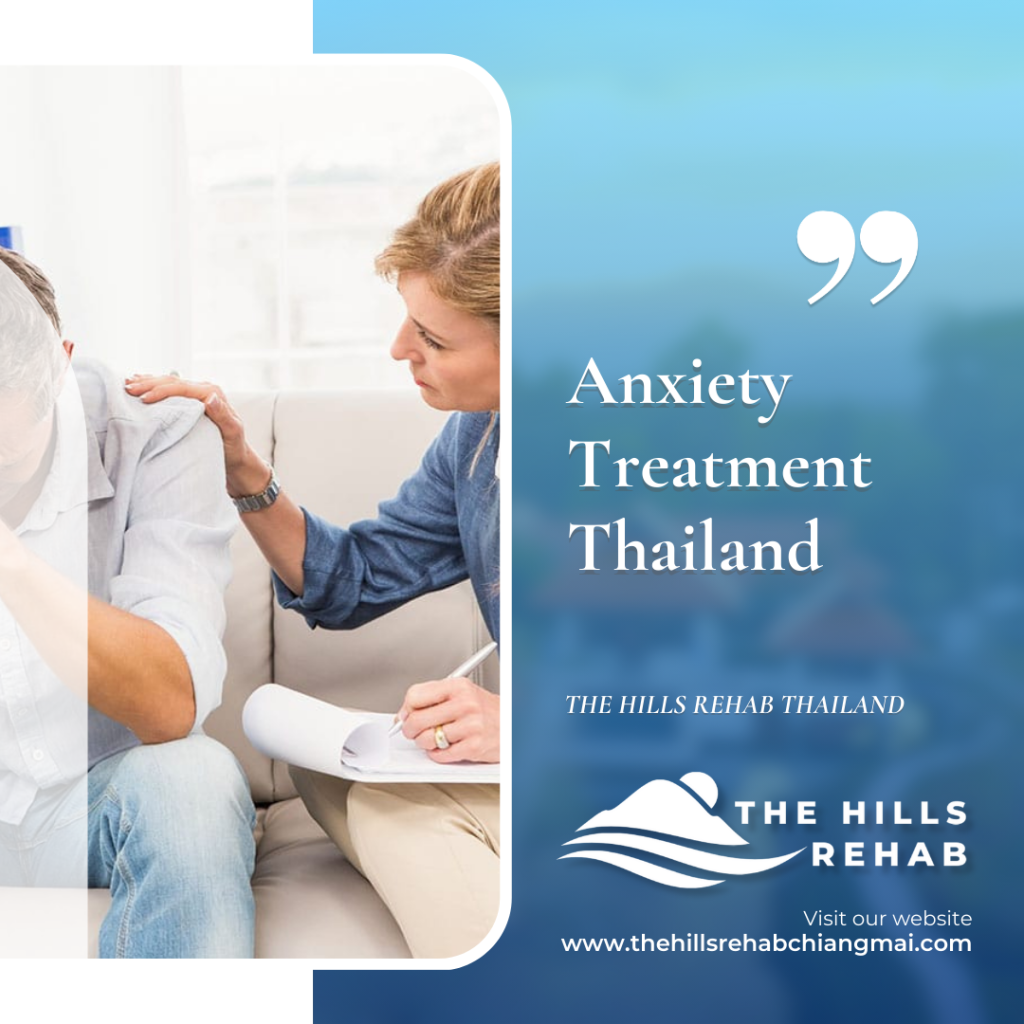
Anxiety Treatment Thailand : The Hills Rehab Thailand is a well-known rehabilitation center that offers comprehensive treatment for various issues, including anxiety, addiction, and mental health disorders. Located in a serene environment, it provides a mix of traditional and holistic approaches to recovery. Their programs typically include therapies such as cognitive-behavioral therapy (CBT), mindfulness practices, counseling, and wellness activities tailored to each individual’s needs.
The facility emphasizes a personalized treatment plan, combining Western therapeutic models with Eastern wellness practices, which can be particularly effective for those dealing with anxiety. The peaceful setting in Thailand’s natural environment also helps create a calming atmosphere conducive to healing.
If you’re interested in more specific information about their programs or looking into reviews and costs, it’s advisable to visit their official website or contact them directly.
Anxiety is a natural response to stress, but it becomes a concern when it’s persistent, overwhelming, and affects daily life. Understanding the signs, symptoms, effects, and available treatments can help in managing and overcoming anxiety disorders.
Anxiety treatment involves various approaches to help individuals manage and reduce anxiety symptoms. Anxiety is a natural stress response, but when it becomes excessive or persistent, it may require treatment. Common anxiety disorders include generalized anxiety disorder (GAD), social anxiety disorder, panic disorder, and specific phobias.
Common Anxiety Treatments
Psychotherapy (Talk Therapy)
Medication
Lifestyle Changes
Alternative Therapies
Support Groups and Counseling
The choice of treatment depends on the type and severity of anxiety, individual preferences, and the guidance of a healthcare provider. Often, a combination of therapies works be
hoosing The Hills Rehab in Thailand for anxiety treatment comes with several advantages. Here are key reasons why people may opt for this facility:
1. Personalized and Comprehensive Treatment Plans
The Hills Rehab provides individualized treatment plans tailored to the specific needs of each client. They assess each person’s mental, emotional, and physical condition to create a holistic approach that addresses the root causes of anxiety.
2. Expert Multidisciplinary Team
The center is staffed by experienced professionals, including psychologists, counselors, medical doctors, and wellness experts who specialize in treating anxiety and co-occurring mental health disorders.
3. Therapeutic Environment in a Serene Setting
Located in the peaceful surroundings of Northern Thailand, The Hills Rehab offers a tranquil environment conducive to healing. The natural beauty and calm atmosphere can significantly aid in reducing anxiety and stress.
4. Combination of Traditional and Holistic Therapies
The facility integrates evidence-based therapeutic methods like Cognitive-Behavioral Therapy (CBT) and mindfulness-based stress reduction with holistic practices such as meditation, yoga, and nutrition. This combination helps in treating anxiety from multiple angles.
5. Privacy and Comfort
The Hills Rehab emphasizes client confidentiality and comfort. The accommodations are private and designed to make clients feel at home, which is especially beneficial for those needing a safe and supportive space to recover.
6. International Standard of Care at Affordable Rates
Compared to similar facilities in Western countries, The Hills Rehab offers high-quality care at more affordable rates, making it an attractive option for those seeking effective treatment without the high cost.
7. Focus on Long-Term Recovery
The program doesn’t just aim to provide short-term relief; it focuses on equipping clients with the tools and coping mechanisms necessary for sustained mental health and anxiety management, even after leaving the facility.
8. Aftercare and Support
The Hills Rehab provides robust aftercare programs to help clients transition back into everyday life while maintaining the progress made during treatment. Continued support is critical for preventing relapse and managing anxiety in the long run.
For those looking for a comprehensive and holistic approach to treating anxiety, The Hills Rehab in Thailand offers a unique blend of professional care, serene surroundings, and effective therapeutic practices.
Physical Symptoms:
Psychological Symptoms:
Behavioral Symptoms:
Short-Term Effects:
Long-Term Effects:
Psychotherapy (Talk Therapy)
Medication
Lifestyle and Self-Care
Alternative Therapies
Support Groups and Counseling
When to Seek Help
If anxiety becomes overwhelming, interferes with daily life, or leads to panic attacks, it’s important to seek professional help. Early intervention can prevent anxiety from escalating and can greatly improve quality of life.
Are you in need of assistance on your journey to recovery? Contact us. We are here to help. At our reputable rehab center, we offer a complimentary consultation to provide guidance and support tailored to your specific needs.
"*" indicates required fields
TH:
USA/CAN:
Thailand :
UK:
AUS:
Whatsapp: